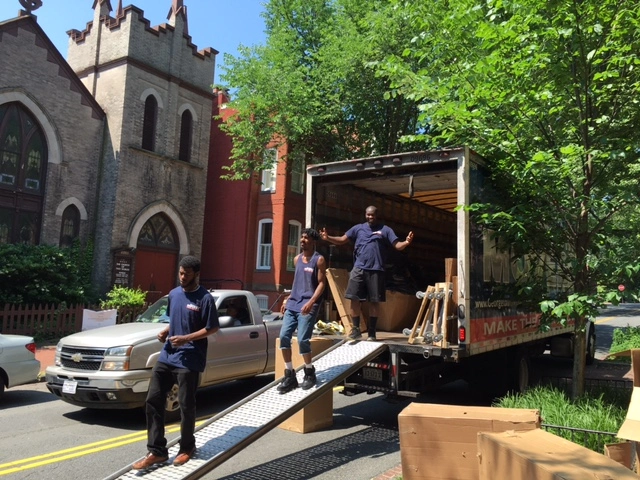Moving is stressful enough on its own, but having to suddenly relocate long-distance on short notice can feel totally overwhelming. One minute you’re settled in Chicago, and the next you’re scrambling to pack up your whole life and move somewhere new in just a few weeks or less. It’s a lot to take on! But with some strategic planning and preparation, you can make this abrupt moving process feel much more manageable.
The key is staying focused and not letting the pressure derail you. In this post, I’ll walk through crucial steps like researching movers on the internet by searching “movers Chicago” to handle the logistics, ruthlessly sorting through your belongings to lighten your load, transferring services, and adjusting your schedule.
Following this organized game plan can help transform a nerve-wracking short-notice move into a smooth transition to your new home.
Secure Housing at Your New Location
Moving to a new city on short notice can be stressful, but with some preparation, you can find secure housing options quickly. Start researching apartments and housing rentals online for your new location as soon as you know you’ll be moving.
Be flexible on neighborhood or location if you’re short on time, as you can always move again later. If renting, compile needed paperwork like pay stubs, IDs, and letters of recommendation ahead of time for rental applications. Schedule virtual tours for any promising apartment or house listings that fit your needs and price range.
Then book appointments to see the top choices in person as soon as you move to the new city and are available to tour. Securing housing quickly will provide a stable foundation in your new location.
Schedule Movers and Logistics
With an impending long-distance move on a short timeline, you’ll need to book movers and coordinate logistics. Research moving companies like last minute movers Chicago and get quotes for a long-distance move, considering your timeline. Be flexible on dates if you can move one to two weeks after your actual move-in date to get more affordable rates.
Once you confirm a moving date, book movers as soon as possible, since they fill up quickly during peak times. Ask what packing materials, tools, and services they provide, so you know what you’ll need to procure yourself. Outline a packing timeline and schedule cleaners and repairs for your old and new homes.
Designate rooms or areas to pack each day to stay on track. Confirm your change of address and mail forwarding with the post office. Cancel and transfer utilities and services well ahead of your moving date. With movers and detailed timelines booked ahead of major moving tasks, you’ll reduce stress, avoid forgetting important details, and stay organized throughout the process.
Sort and Purge Your Belongings
When moving long distances, you’ll likely need to downsize your belongings significantly. Go through each room and be ruthless about decluttering, as you won’t have time for a garage sale. Focus on getting rid of things you haven’t used in over a year unless they hold special sentimental value.
Donate or sell any large, cheaply made furniture that isn’t worth the cost of moving cross-country. Be strategic about what you pack vs. repurchase later – kitchen gadgets and linens are often cheap to replace after moving. Pack an “Open First” box with daily essentials you’ll need immediately. Purging before packing will reduce your belongings to just what’s essential, and save you moving expenses.
Transfer Utilities and Services
To close out your old place and activate your new one, you’ll need to transfer utilities and services. Contact each utility company to cancel services at your old address around 1-2 weeks after you move out. Schedule new utilities like electricity, gas, internet, and cable under your name to turn on by your exact move-in date.
This ensures they are ready to go on day one. Submit a change of address to the USPS to forward your mail to your new address. Update your address with banks, employers, magazine subscriptions, and other accounts to prevent lapses in service. Transferring utilities and services in a timely manner will make your move logistically smooth while closing out your old place responsibly.
Update Important Documents
Before your move, take time to update your important accounts and documents. Go through your ID cards, vehicle registration paperwork, and insurance policies, and update your new address. Request updated medical and dental records, prescriptions, and veterinary records to transfer to new providers.
Update kids’ school enrollment and arrange new transportation if needed. Update your resume with your new address if you are job searching in your new location. Make a list of all accounts tied to your address so nothing gets overlooked. Having your key documents and accounts reflecting your new address ensures seamless service, benefits, and records when relocating.
Pack Strategically
Packing for a big move takes planning and organization. Start by creating a master to-do list and checklist of everything in your home that requires packing. Begin packing non-essentials first, like out-of-season clothes, decorations, and books. Pack a dedicated “first-night” bag with pajamas, toiletries, phone chargers, and essentials to have ready for your first night in the new home.
Use color-coded labels by room so boxes are easy to unpack later. Back up digital files and charge devices before traveling to the new location. Starting early and strategically will prevent last-minute panicking, and ensure you have what you need immediately upon arriving and unpacking in your new home.
Adjust Your Schedule
Moving long distances requires flexibility in your work and life schedule. Take time off work for packing, traveling, and getting settled in the week before and after your move, if possible. You may need to book temporary accommodations like an Airbnb in your new city if your move-in date doesn’t match your apartment’s lease start date.
When unpacking, focus on setting up your bedroom first so you have a comfortable place to sleep, then tackle priority boxes like the kitchen, bathroom, and work supplies. Expect an adjustment period as you get settled – give yourself grace as you learn the new city, commute, and routines.
Moving is hugely disruptive, so be prepared to take it slowly as you establish your bearings. With realistic expectations, temporary accommodations, and ample time off, you can make this transition period smooth and successful.
Conclusion
With preparation like securing housing, scheduling Chicago long distance movers, purging belongings, transferring services, and packing strategically, you can successfully handle a short-notice long-distance move and adjustment to your new Chicago home.


